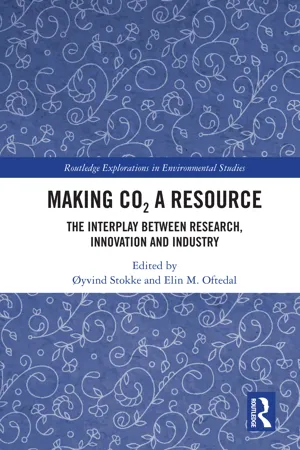
Making CO₂ a Resource
The Interplay Between Research, Innovation and Industry
- 216 pages
- English
- ePUB (mobile friendly)
- Available on iOS & Android
Making CO₂ a Resource
The Interplay Between Research, Innovation and Industry
About This Book
This interdisciplinary book explores how CO2 can become a resource instead of a waste and, as such, be a tool to meet one of the grandest challenges humanity is facing: climate change.
Drawing on a Norwegian narrative that has significance for a global audience, Øyvind Stokke and Elin Oftedal introduce in-depth, multi-perspective analyses of a sustainable innovation research experiment in industrial carbon capture and utilisation technologies. Building on extensive literature within marine sciences, sustainability research, and environmental philosophy and ethics, this book documents how a misplaced resource like CO2 can become valuable within a circular economy in its own right, while at the same time meeting the challenge of food security in a world where food production is increasingly under pressure. The book is diverse in scope and includes chapters on how to reduce the environmental footprint of aquaculture by replacing wild fish and soy from the Amazon, how to optimise the monitoring of aquatic environments via smart technologies, and how to replace materials otherwise sourced from natural environments. The authors also analyse the pivotal role of the university in driving innovation and entrepreneurship, the pitfalls of different carbon technologies, and explore how the link between petroleum dependence and CO2 emissions has been addressed in Norway specifically.
Making CO2 a Resource will be of great interest to students and scholars of climate change, environmental ethics, environmental philosophy, sustainable business and innovation, and sustainable development more broadly.
Frequently asked questions
Information
Table of contents
- Cover
- Half Title
- Series
- Title
- Copyright
- Contents
- List of Contributors
- 1 Making CO2 a resource: green innovation for an ecological economy. An introduction
- 2 Industrial CO2 capturing by mass cultivation of microalgae (diatoms): processes, sustainability, and applications
- 3 New marine ingredients for future salmonid feeds
- 4 The sustainable development goals, human rights, and the capability approach in an Arctic context
- 5 Transforming resources: the university as a CO2 catalyst
- 6 IoT expectations and challenges in monitoring the bioreactors
- 7 From CCS to CCU and CCUS – the pitfalls of utilisation and storage
- 8 Black is the new green: sustainable diffusion of Innovation
- 9 Attuning our consumption and food production systems: an environmental virtue ethics approach to algae-based carbon capture and utilisation, and feed use in salmon farming
- 10 Unifying the threads: is carbon a resource?
- Index